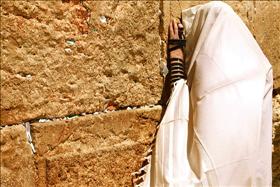An angle that has not been covered by the US media, including the Jewish media
Israeli religious leaders' theological responses to the US elections
Some days out after the US elections, we can now take a look and share with you an angle that has not been covered by the US media, including the Jewish media. Namely, the Israeli religious "angle," both prior to and immediately after the elections. Needless to say, Hiddush, which focuses solely on issues of religion and state in Israel, is not taking a stand on the merits of the campaigns, the desirability of the candidates, the election results, nor the plethora of political post-election reactions in Israel, mostly from settlers and right-wing political party leaders.
15/11/2016 12:02
Tags: Arye Deri · Eli Yishai · Moshe Gafni · Israel Eichler · US elections · theology

A Jew praying at the Western Wall; source: Wikipedia
These religiously motivated arguments and positions bear much relevance to the overall religion-and-state challenge facing Israel, as we find such political stances couched in theological argumentation, which is often antithetical to democratic discourse and decision making.
One major player in the Government, Minister Rabbi Deri, the ultra-Orthodox Shas Party leader, responded to the election results, saying that Donald Trump’s election might herald the coming of the Messiah due to the blow he expects President-elect Trump to strike against the “non-Orthodox Jewish hold on the US government.”
Likewise, senior United Torah Judaism Party leader MK Rabbi Gafni (another major player in Israel's current Government Coalition) was of similar mind, predicting that Reform and Conservative influence in Israel would now wane. “Naturally, Reform [Jews] mostly identified with the Democratic government," he explained, "and now their influence will weaken."
MK Rabbi Israel Eichler, a Knesset member representing the ultra-Orthodox Agudat Israel faction of the sitting Government, declared that the American public had voted against the rotten and corrupt establishment of liberal and obscene culture. He expressed his hope that the "State of Tel Aviv" would learn from the fall of the "State of New York and California."
The reason for Trump's divinely ordained election was to protect the sanctity of the Land of Israel.
Meanwhile, Rabbi Yishai, the former Shas Party leader and current political contender, posted on Facebook regarding the election results. According to Yishai, Donald Trump's election was not the choice of the voters, but rather God's doing. Further, opined Yishai, the reason for Trump's divinely ordained election was to protect the sanctity of the Land of Israel. If one should think the US election had anything to do with domestic American interests, Rabbi Yishai set us straight: those issues weren't on God's mind.
Rabbi Mordechai Gross, a leading rabbi in the City of B'nei Brak, voiced his opinion that "It's a miracle that [Clinton] was not elected. If she had been, it would have damaged [all of] creation."
Even before the election, leading Israeli religious figures were voicing their support for Donald Trump. For example, upon being asked whether voting for Trump was religiously permitted, due to the candidate's behavior and personal opinions standing in contrast to the Torah, Rabbi Sternbach, a leader of the Eidat Haredit, answered that if these traits were limited to Trump's personal life, it would be okay to vote for him. Not taking anything for granted, another famed rabbi, the Kabbalist Rabbi Dov Kook fasted for three consecutive days, praying for Clinton's defeat and Trump's election. "This election," he explained, "is an important step in the process of Redemption."
Needless to say, the US elections surrounded a variety of issues, and theological considerations from Israel's religious leadership were marginal at best. In essence, these elections simply became another opportunity for some of the key players in Israel's religion-and-state saga to express their theological views, painting the election results very differently than the average person would do. We appreciate the reminder of this collective religious worldview.